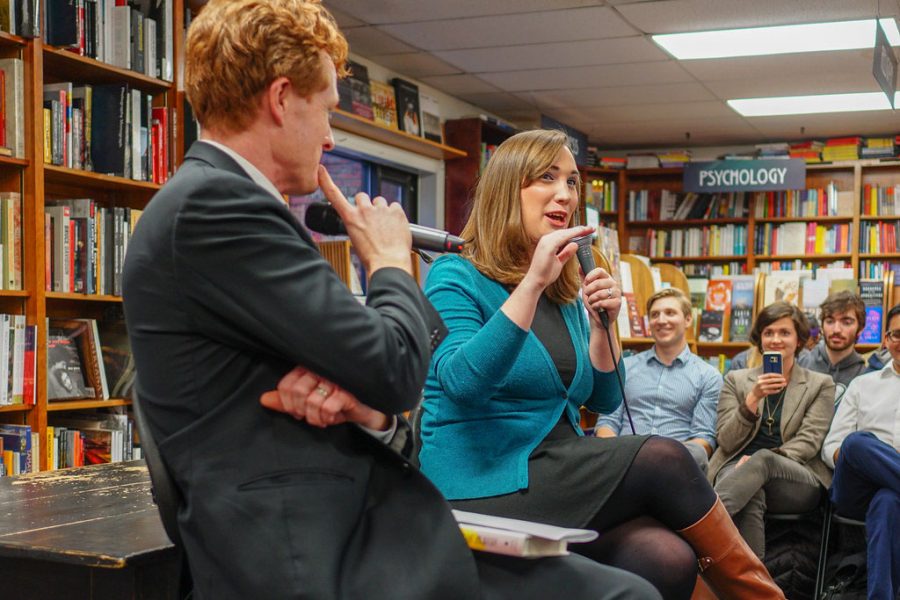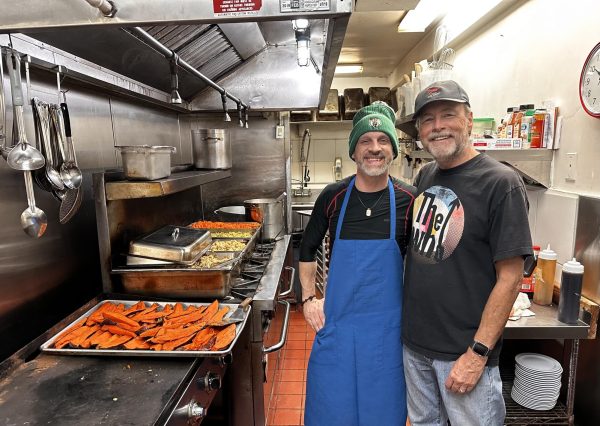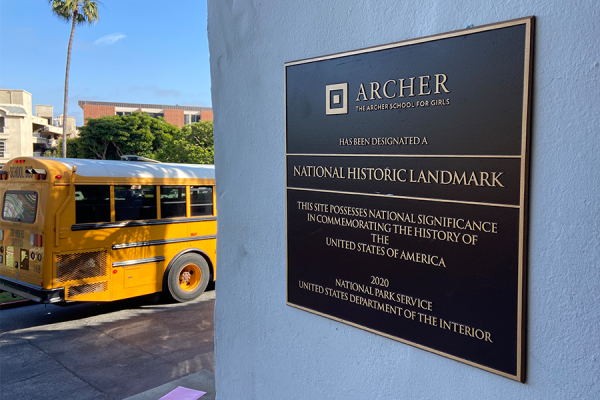Gender and Sexuality Alliance leaders reflect on political firsts for LGBTQ community
Photo credit: Ted Eytan from Creative Commons, licensed for reuse
Sarah McBride speaks at an event at the Politics and Prose bookstore in Washington, D.C. On Nov. 3, 2020, McBride won a seat in Delaware’s state senate, which will make her the country’s highest ranking transgender lawmaker in history.
December 8, 2020
The elections of 2020 extend beyond the executive branch: voters also choose to elect new congresspeople and pass propositions. This year, history was made as LGBTQ lawmakers have officially won over 220 elections.
Stephanie Ferri, who has led Archer’s Gender and Sexuality Alliance [GSA] for 10 years, called the results a “remarkable win for the LGBTQ community.” She helped lead an affinity space for LGBTQ members of the Archer community on Thursday, Nov. 5, when the results of the presidential election were still unclear.
“Like so many people, I was caught up in the results of the presidential election and was just on standby for all those days,” Ferri said. “In the uncertainty of all of that, as we were planning for an LGBTQ affinity space, and then upcoming GSA meetings, [we shifted] focus onto all the amazing LGBTQ people that were elected this year. It helped to reframe [the election] into this really positive and awesome experience.”
The 2020 election season ushered in some of the country’s first transgender lawmakers, including Sarah McBride of Delaware, Taylor Small of Vermont and Stephanie Byers of Kansas. GSA leader Ariel Heimanson described this representation as “great,” and believes it will bring about “a lot of great change.”
“[The transgender community] is definitely something that is not represented enough,” Heimanson, who identifies as cisgender, said. “In my opinion, those were really great examples of how much LGBTQ community was represented in this election.”
Ferri, who also identifies as a member of the LGBTQ community, echoed this exact sentiment, emphasizing the importance of representing transgender people in addition to those with different sexual orientations.
“Over over the past five or six years, the gay community, we’ve had a lot of wins and successes,” Ferri said. “So it’s really nice to see members of the transgender community get some of this recognition and get some votes to get in office, because I feel like we still have like a long way to go when it comes to transgender rights.”
Despite positive feelings towards new representation, members of Archer’s GSA also expressed “worries” about the current political climate. Reported threats of violence created tension for Grace DeLossa, a GSA leader and member of the LGBTQ community.
“I go for walks in my neighborhood all the time, and my parents struggle before letting me go because I go alone. [Around the time of the election,] they stopped me and they’re like ‘You have to be careful because people are kind of like looking for a fight, especially around the election,'” DeLossa said. “I remember this is the feeling of fear and dread that women always talk about walking alone at night. And it just made me think of how we live in a country where so many people, myself included are scared to do things that they shouldn’t be because of the political climate.”
Heimanson said that her “biggest worry” is the increased political polarization of our country over the past four years, and hopes connectivity and understanding between Americans will improve.
“I think that I just want our country to be continuing to work on being inclusive of people and being open to people,” Heimanson said. “That includes LGBTQ people, but that also includes people who are just different minds, different opinions, I think that just being inclusive of everyone, and just being able to be respectful of people, I think, is my greatest hope for our upcoming years.”
On a federal level, New York elected two Black LGBTQ lawmakers to the U.S. Congress. Ferri praised the visibility of “intersectionality” in these new congressmen.
“[We are electing] not just gay people, not just people of color, but like a combination of those things, which I thought was really important. And it was just cool to celebrate it and think about it,” Ferri said.
GSA leaders also reflected on Indiana mayor Pete Buttigieg‘s campaign for the presidency. Although he did not win the democratic nomination, his popularity was historic for a gay politician, as was his openness in campaigning with his husband. Ferri said she was “really excited to vote for [Buttigieg].”
“I was really excited, because I was like, ‘Here’s some good representation,'” DeLossa said. “But I guess in my heart I knew that at this point in our country, it wouldn’t happen. I knew that he wasn’t going to be the right choice for the democrats because, as much as he could have made a great president, he wasn’t going to be able to beat Trump.”
However, Ferri, Heimanson and DeLossa all emphasized the importance of celebrating other victories.
“I think it was really easy to overlook these wins,” Heimanson said. Because I think everyone was really, really focused on the presidential election, which understandable it’s the president. No matter what the outcome is, I still understand that there’s so much change being taken, and there’s so much change happening in our nation as a whole.”




















Stephanie Ferri • Dec 21, 2020 at 7:08 am
Such an important topic. Thank you for highlighting this historical moment and bringing the the LGBTQ and allies perspective.